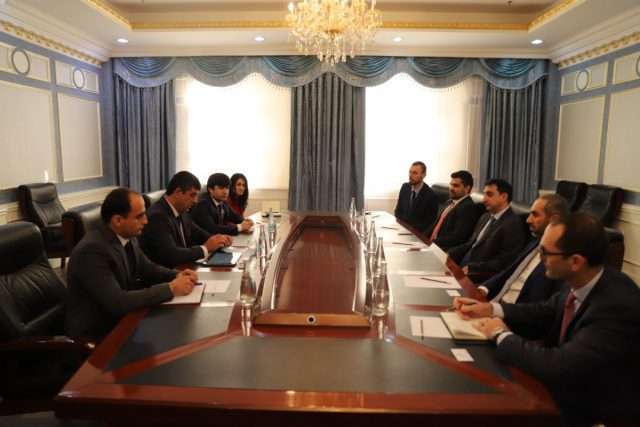
Geopolitical Report 2785-2598 Volume 12 Issue 8
Author: Giuliano Bifolchi
The United Arab Emirates (UAE) is among the Gulf countries the most active in Central Asia, as demonstrated by the participation of an Emirati business delegation at the International Business Forum Dushanbe-Invest 2021. Abu Dabhi’s investments in Tajikistan highlight Emirati strategy in the country and, generally speaking, in Central Asia to exploit economic opportunities and investment projects to make the UAE a leading foreign actor in the region.
On October 15th, 2021, Deputy Minister of Foreign Affairs of the Republic of Tajikistan Sharaf Sheralizoda received a delegation of Abu Dhabi Ports and Talc Investment of the United Arab Emirates, invited to participate in the International Business Forum Dushanbe-Invest 2021.
During the meeting, the parties exchanged views on expanding trade and investment cooperation and the possibilities of direct partnership between the two countries’ private sector, considering the many untapped opportunities for bilateral cooperation.
Emirati Interests in Central Asia
The UAE has been actively involved in Tajik economy and investment projects as part of Abu Dabhi’s strategy to become a key actor in Central Asia. Undeniably, Central Asia has proven its significant role in the Eurasian geopolitical chessboard and international arena because, since the collapse of the Soviet Union in 1991 and the independence of the Central Asian republics, global powers and regional actors have fought to influence or affirm their presence in these countries rich in natural and energy resources. Along with Russia, China, Turkey, Iran, the United States and some EU member states, the Gulf Arab countries have also begun to actively strengthen their influence in the region, particularly the United Arab Emirates.
Analysing Abu Dabhi’s foreign policy, Central Asian republics are acquiring increasingly more geopolitical importance, considering UAE’s rivalry with Turkey and Iran in the religious sphere, economic and energy sector, and strategic presence in the Middle East, North Africa and, obviously, Central Asia.
In the competition with Iran and Turkey (Turkey and pan-Turkism in Central Asia: challenges for Russia and China; Iran e Kirghizistan discutono la cooperazione regionale), the UAE might use its financial resources to consolidate geopolitical influence in Central Asia. Remarkably, Abu Dabhi can use investments and trade to become an essential player in the economic development of Central Asian republics. From this perspective, the UAE has used the leading sovereign wealth fund Mubadala to invest copiously throughout Central Asia, especially in energy and port infrastructure.
For instance, Mubadala has invested in energy projects in Kazakhstan and the production and distribution of electricity in Uzbekistan. Dubai-based logistics giant DP World took part in constructing Aktau port in Kazakhstan and the Khorgos-Eastern Gate Special Economic Zone (Kazakhstan and UAE strengthened their economic partnership). Dragon Oil, an independent international oil and gas exploration, development and production enterprise based in Dubai, is the only non-Turkmen enterprise pumping Turkmen oil (UAE investments in Turkmenistan confirm Abu Dabhi’s potential role in Central Asia).
Since the oil price crisis, the Central Asian republics of Kazakhstan, Uzbekistan, and Turkmenistan have sought investments and know-how to diversify their economy by developing clean energy and nuclear technologies. The UAE might help these countries with economic diversification and logistic development since Central Asia has become a strategic asset in Beijing’s Belt and Road Initiative. In reality, the region might connect the Caspian ports in Kazakhstan and Turkmenistan with the Black Sea, Europe, the Middle East, and Asia.
During the pandemic, Abu Dabhi was also engaged in ‘humanitarian diplomacy’ by assisting Kazakhstan, Kyrgyzstan, and Uzbekistan with tons of humanitarian aid, strengthening its soft power in Central Asia. The UAE’s humanitarian assistance was part of the Emirati strategy to reinforce its regional reputation and promote its values among the local population.
Conclusion
Considering that Qatar and Saudi Arabia are actively involved in promoting their presence in Central Asia through financial investments and supporting infrastructural projects (Cooperation among Qatar and Uzbekistan), and taking into account Russia and China’s role in regional sociopolitical and economic dynamics, the UAE has used all the means possible to affirm their presence in this strategic area and counter its rivalries’ strategies. In this framework, it is possible to forecast a significant Emirati economic and religious involvement in Central Asia, interpreted by regional governments as an opportunity to diversify investments and decrease the international powers’ economic leverage.



